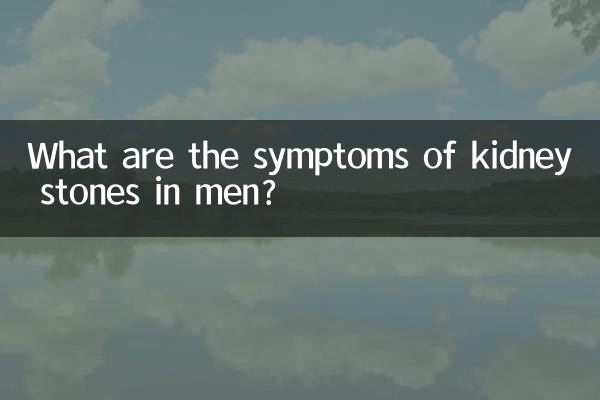What are the symptoms of kidney stones in men?
Kidney stones are a common urinary system disease that is more common in men than women. In recent years, the incidence of kidney stones has been on the rise, especially in summer, when sweating more and drinking less water make it easier to induce kidney stones. This article will introduce in detail the symptoms, causes, diagnosis and treatment of kidney stones in men to help everyone better understand and prevent this disease.
1. Common symptoms of kidney stones in men

The symptoms of kidney stones vary depending on the size, location and whether the stone has moved. The following are typical symptoms of kidney stones in men:
| Symptoms | Description |
|---|---|
| lower back or abdominal pain | Sudden severe pain, often starting from the waist and radiating to the abdomen, groin or inner thighs. |
| Hematuria | Urine is pink, red, or brown, visible to the naked eye or under a microscope. |
| Frequent urination and urgency | Frequent urination and low urine output, accompanied by discomfort during urination. |
| Nausea, vomiting | Nausea and vomiting may occur due to severe pain or nerve irritation from stones. |
| Fever, chills | If stones cause urinary tract infection, systemic symptoms such as fever and chills may occur. |
2. Causes of kidney stones
The formation of kidney stones is related to many factors. The following are common causes:
| Cause | Description |
|---|---|
| Not enough water | The urine becomes concentrated and mineral deposits form stones. |
| High-salt, high-protein diet | Increase the excretion of calcium, uric acid and other substances in urine and promote stone formation. |
| Metabolic abnormalities | Such as hyperuricemia, hypercalciuria, etc., increase the risk of stones. |
| urinary tract infection | Certain bacteria break down urea, causing the urine to become alkaline and forming infected stones. |
| genetic factors | People with a family history of kidney stones are more likely to develop the disease. |
3. Diagnostic Methods of Kidney Stones
If the above symptoms occur, you should seek medical treatment promptly. The following are common diagnostic methods:
| diagnostic methods | Description |
|---|---|
| Urine test | Detect red blood cells, white blood cells, crystals, etc. in urine to determine whether there is infection or stones. |
| blood test | Assess kidney function, calcium, uric acid and other indicators to find the potential cause of stones. |
| Imaging examination | Including B-ultrasound, X-ray, CT, etc. to determine the location, size and number of stones. |
4. Treatment methods for kidney stones
Treatment options for kidney stones depend on the size and symptoms of the stone. Here are some common treatments:
| Treatment | Applicable situations |
|---|---|
| Medication to remove stones | It is suitable for stones with a diameter less than 5mm, and can relieve pain and promote stone expulsion through medicine. |
| Extracorporeal shock wave lithotripsy (ESWL) | It is suitable for stones with a diameter of 5-20mm. The stones are broken up by shock waves and then discharged. |
| ureteroscopy lithotripsy | It is suitable for stones in the middle and lower segments of the ureter, and can be directly broken up through the endoscope. |
| percutaneous nephrolithotripsy | Suitable for larger kidney stones, the kidney stone is broken into through a small incision on the back. |
| open surgery | It is suitable for complex stones or cases where the above methods are ineffective. |
5. How to prevent kidney stones
The key to preventing kidney stones is to adjust your lifestyle and eating habits:
| Precautions | Specific methods |
|---|---|
| drink more water | Drink at least 2000ml of water every day to keep urine light. |
| low salt diet | Reduce sodium intake and avoid high-salt foods. |
| Control protein intake | Avoid excessive intake of animal protein, especially red meat. |
| Eat more fruits and vegetables | Add fruits rich in citric acid, such as lemons and oranges, to inhibit stone formation. |
| Regular physical examination | Especially people with a history of stones should have their urine and kidney function checked regularly. |
Summary
Kidney stones are a common urinary system disease in men, which mainly manifests as severe pain in the waist or abdomen, hematuria, frequent urination and other symptoms. The cause of the disease is complex and related to factors such as insufficient drinking water, dietary structure, and metabolic abnormalities. Diagnosis is mainly through urine, blood tests and imaging tests. Treatment methods include medications, extracorporeal lithotripsy, and surgery. The key to preventing kidney stones is to drink more water, adjust your diet and have regular physical examinations. If relevant symptoms occur, you should seek medical treatment promptly to avoid delays in treatment.

check the details

check the details